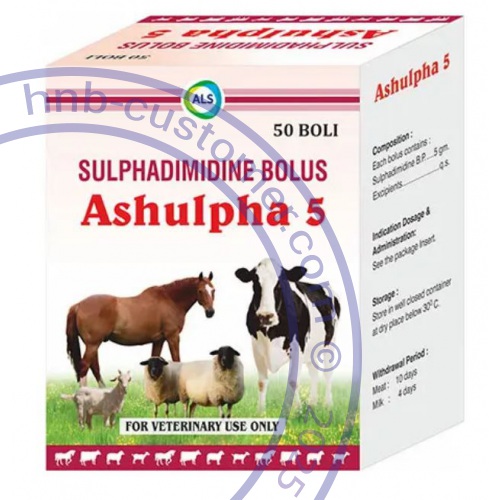Ashulpha Tablets
What is this medicine?
Ashulpha - tablets, containing 5mg of Sulfamethazine (Synonyms: Sulfadimidine; Sulfadimerazine), is an antimicrobial, antibacterial, bacteriostatic agent of the sulfonamide group. Sulfadimidine acts usually bactericidal against many Gram-positive and Gram-negative microorganisms like E. coli, Staphylococcus, Streptococcus, Salmonella, Pasteurella and Eimeria spp, so is used as a broad-spectrum antimicrobial to treat or prevent infections caused by susceptible organisms. Infections treated may include pneumonia, intestinal infections (especially coccidia), soft tissue infections and urinary tract infections (UTIs). Sulfadimidin affect bacterial purine synthesis, as a result of which a blockade is accomplished.
What are the indications for using this medicine?
Gastrointestinal, respiratory and urogenital infections caused by sulfadimidine sensitive microorganisms like E.coli, Staphylococcus, Streptococcus and Pasteurella spp. in calves, cattle, goats, poultry, sheep and swine, and coccidiosis caused by Eimeria spp. in poultry. Sulfadimidine, which is also known as sulfamethazine, is widely used in veterinary medicine in combination with chlortetracycline and penicillin in pigs for maintenance of weight gain in the presence of atrophic rhinitis, growth promotion and increased feed efficiency. Sulfadimidine is also effective against a wide variety of diseases in food-producing animals.
Common therapeutic uses in cattle include:treatment of bovine respiratory disease complex (shipping fever complex); necrotic pododermatitis (foot rot) and calf diphtheria;colibacillosis (bacterial scours); coccidiosis and acute mastitis and acute metritis.
Common therapeutic uses in sheep include: treatment of pasteurellosis; bacteria pneumonia; colibacillosis (bacterial scours) and control and treatment of coccidiosis.
Common therapeutic uses in pigs include: treatment of bacterial pneumonia; porcine colibacillosis (bacterial scours); bacterial swine enteritis; and reduction in the incidence of cervical abscesses.
Common therapeutic uses in chickens include: control of infectious coryza; coccidiosis; acute fowl cholera; and pullorum disease.
Common therapeutic uses in turkeys include: control of coccidiosis.
How to use this medicine in pets?
Oral administration, following the prescribed dosage of the drug by veterinarian.
Approximate dosages for oral administration:
-
Calves, cattle,goats and sheep:
- 10 g per 100 kg body weight for 3 - 7 days.
- 1 kg per 2000 litres of drinking water for 3 - 7 days.
- 1 kg per 2000 litres of drinking water for 3 days, or according to the 3-2-3 scheme: 3 days on, 2 days off, 3 days on.
Swine:
Poultry:
Note: For pre-ruminant calves, lambs and kids only.
What should I watch for while using this medicine?
There are some contraindications, among them there is hypersensitivity to sulfonamides, administration to animals with a seriously impaired renal and/or hepatic function, or with blood dyscrasias. Do not administer to animals with sensitivity to sulfonamides. Doberman pinschers may be more sensitive than other canine breeds to reactions from sulfonamides. Use cautiously in this breed.
What side effects may I notice from this medicine?
Adverse effects associated with sulfonamides include allergic reactions, Type II and Type III hypersensitivity, arthropathy, anemia, thrombocytopenia, hepatopathy, hypothyroidism (with prolonged therapy), keratoconjunctivitis sicca, and skin reactions. Dogs may be more sensitive to sulfonamides than other animals because dogs lack the ability to acetylate sulfonamides to metabolites. Other, more toxic metabolites may persist.





